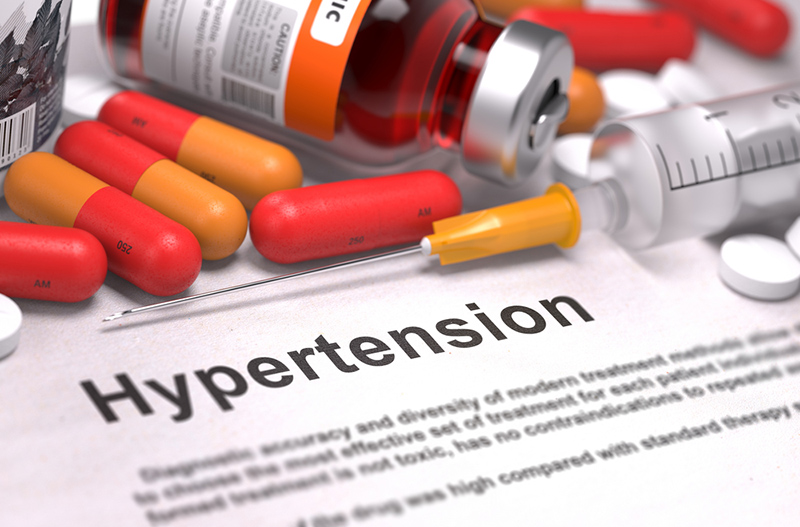
The human body's blood pressure undergoes regular fluctuations and changes with the seasons. Typically exhibits higher levels during winter and lower levels during summer.
During the winter season, the cold weather causes blood vessels to constrict, with less sweating and the blood volume in the vessels remains unchanged, these leading to an increase in blood pressure. Conversely, during the hot summer season, blood vessels dilate, and there is more sweating, resulting in a slightly lower blood pressure. Therefore, patients with hypertension should also pay attention to the fluctuations in blood pressure according to the seasons when taking medication. Under the guidance of a doctor, they should appropriately increase or decrease the dosage and never stop taking medication arbitrarily.
How do Hypertensive Patients Get Through the Summer?
Check blood pressure frequently
If there is a hypertensive patient at home, it is crucial to be extra vigilant in daily life. It is important to have a blood pressure monitor available to measure blood pressure regularly and keep track of one's own blood pressure. This way, individuals can have a better understanding of their blood pressure situation and be prepared to take necessary actions or seek medical attention promptly if any issues arise.
The chief physician of the Cardiology Department at Nanjing Second Hospital recommends using an upper arm fully automatic oscillometric electronic blood pressure monitor as the preferred choice for home blood pressure measurement. This type of blood pressure monitor offers good accuracy and repeatability, and the measurement method is easy to learn.
For individuals residing in cold regions or those who find it inconvenient to remove clothing, a wrist blood pressure monitor is more convenient to use. However, there can be significant differences in the placement method of the forearm among different blood pressure monitors. It is essential to strictly follow the instructions provided with the specific blood pressure monitor for accurate measurement.
Finger blood pressure measurement yields significantly different and more variable results compared to upper arm blood pressure measurements. Therefore, using a finger blood pressure monitor is not recommended.
Mercury column blood pressure monitors require specialized training for proper usage, and they are cumbersome to operate and inconvenient to carry. Moreover, mercury is a heavy metal that poses serious health hazards. It is not advisable to use mercury column blood pressure monitors for home blood pressure monitoring.
How to use blood pressure monitor?
1. For the first measurement, measure the blood pressure on both upper arms and use the arm with the higher reading for subsequent measurements.
2. Before measuring, sit in a chair with back support and rest for at least 5 minutes.
3. When measuring blood pressure, place the forearm of the arm with the cuff on a table, ensuring that the midpoint of the cuff aligns with the level of the heart. Keep your legs relaxed and resting on the ground.
4. When measuring blood pressure in other positions, make sure the midpoint of the cuff on the upper arm aligns with the level of the heart.
5. Do not excessively focus on individual blood pressure readings as blood pressure naturally fluctuates. Avoid becoming anxious about specific readings.
When to measure blood pressure:
Measure blood pressure in the morning and evening every day. Each measurement should be taken after resting in a seated position for 5 minutes. Take 2-3 measurements with a 1-minute interval.
For newly diagnosed patients, those in the early stages of treatment, or those whose blood pressure is not yet under control despite treatment, continuous measurements should be taken for 5-7 days before a medical appointment. When blood pressure is well-controlled, measure it at least once a week.
In general, morning blood pressure measurements should be taken within an hour after waking up, before taking antihypertensive medication, before breakfast, and before engaging in vigorous activities.
Evening blood pressure measurements should be taken after dinner and before going to bed.
Empty the bladder before measuring blood pressure each time.
Is the digital upper arm blood pressure monitor accurate?
Electronic blood pressure monitors can be accurate if used properly. Many patients worry about the accuracy of electronic blood pressure monitors and prefer to have their blood pressure measured at the hospital. However, measuring blood pressure at home has fewer environmental and psychological influences, and if the measurements are taken following proper procedures, the readings can be reliable.
At the same time, it is crucial to ensure that you choose a reputable brand of blood pressure monitor, as the brand's reputation and quality assurance can impact the accuracy and reliability of the device. Pangao electronic blood pressure monitor is a common brand for home use and has passed multiple certifications and tests, such as FDA and CE, ensuring higher reliability and accuracy.
Following medical advice and scientifically adjusting medication is crucial.
Maintaining stable blood pressure control throughout the day, especially during the nighttime, is crucial for managing blood pressure during the summer. Blood pressure control is generally easier to achieve in the summer compared to winter. Therefore, it is important for hypertensive patients in the summer to adhere to their prescribed antihypertensive medications.

Avoid not measuring blood pressure.
Many hypertensive patients do not measure their blood pressure and rely solely on their own perception when taking medication. In reality, the severity of the condition and subjective symptoms are not necessarily correlated. For example, even with low blood pressure, dizziness may occur. Taking medication in such cases can trigger hypotension.
Avoid not taking medication without obvious symptoms.
Many patients refrain from taking medication because they do not experience obvious symptoms. In some cases, they may only realize the high blood pressure and regret their decision when severe cardiovascular complications occur, such as cerebral hemorrhage, stroke, or myocardial infarction.
Avoid altering the dosage.
Antihypertensive medication should be started with a low dosage.Many patients mistakenly believe that increasing the dosage or frequency of medication can lead to rapid blood pressure reduction. However, this hasty approach can cause a sudden drop in blood pressure, increasing the risk of myocardial infarction or ischemic stroke.
Avoid intermittent medication.
Hypertension is a chronic condition that often requires lifelong medication. Intermittent medication, due to temporary stabilization of blood pressure, can sometimes lead to rebound hypertension. If blood pressure is stable, under the guidance of a doctor, the dosage can be gradually reduced. However, medication should never be stopped without medical advice.
Avoid indiscriminate use of medication.
There are many different types of antihypertensive drugs with varying mechanisms of action. It is important to take them under the guidance of a doctor to avoid exacerbating adverse drug reactions.
Lifestyle changes
1. Adopt a low-sodium and low-fat diet. Eat meals that are about 70-80% full, and include plenty of vegetables in your diet. Drink an adequate amount of water.
2. Quit smoking and limit alcohol consumption.
3. Engage in regular exercise. Choose activities in the morning or evening and avoid intense exercise. Exercise helps control blood pressure and maintain overall health.
4. Maintain a healthy weight and avoid being overweight or obese. This can be achieved through a combination of healthy eating and regular physical activity.
5. Manage stress and strive for a positive mindset. Find ways to relax and engage in activities that bring you joy and peace of mind. Stress management techniques such as deep breathing exercises, meditation, or engaging in hobbies can be beneficial.

Remember, it is important to consult with a healthcare professional or a registered dietitian for personalized advice and guidance on lifestyle modifications for managing blood pressure effectively.
Subscribe means that you have read and agree to the Privacy Policy.
Subscribe means that you have read and agree to the Privacy Policy.
Copyright © Shenzhen Pango Medical Electronics Co.,Ltd, Ltd. All Rights Reserved.